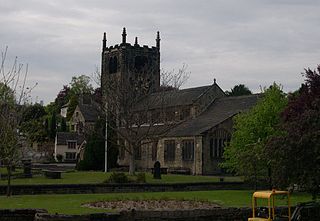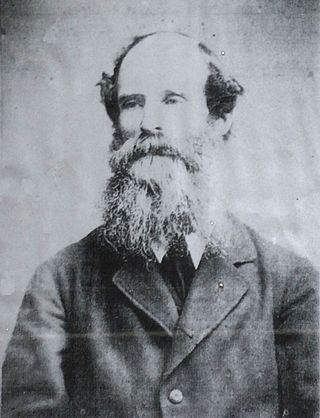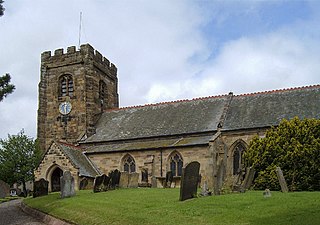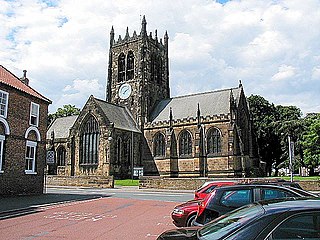
William Butterfield was a British Gothic Revival architect and associated with the Oxford Movement. He is noted for his use of polychromy.

Sir Arthur William Blomfield was an English architect. He became president of the Architectural Association in 1861; a Fellow of the Royal Institute of British Architects in 1867 and vice-president of the RIBA in 1886. He was educated at Trinity College, Cambridge, where he studied Architecture.

Church of All Saints is the Anglican parish church in the town of Bingley, West Yorkshire, England. It is one of two Anglican churches in the town, the other being Holy Trinity. All Saints has existed since Norman times and it is set in the oldest part of the town, near to where the River Aire is crossed by Ireland Bridge.

William White, FSA (1825–1900) was an English architect, noted for his part in 19th-century Gothic Revival architecture and church restorations.

Yafforth is a village and civil parish in North Yorkshire, England about 1 mile (1.6 km) west of Northallerton. The village lies on the B6271 road between Northallerton and the village of Scorton. The parish had a population of 174 in the 2011 census.
Benjamin Ferrey FSA FRIBA was an English architect who worked mostly in the Gothic Revival.

Leeds Minster, or the Minster and Parish Church of Saint Peter-at-Leeds is the minster church of Leeds, West Yorkshire, England. It stands on the site of the oldest church in the city and is of architectural and liturgical significance. A church is recorded on the site as early as the 7th century, although the present structure is a Gothic Revival one, designed by Robert Dennis Chantrell and completed in 1841. It is dedicated to Saint Peter and was the Parish Church of Leeds before receiving the honorific title of "Minster" in 2012. It has been designated a Grade I listed building by Historic England.

The Minster Church of St Nicholas is the minster and parish church of the town of Great Yarmouth, in Norfolk, England. It was built during the Norman era and is England's third largest parish church, behind Beverley Minster in East Yorkshire and Christchurch Priory in Dorset. It was founded in 1101 by Herbert de Losinga, the first Bishop of Norwich, and consecrated in 1119. It is cruciform, with a central tower, which may preserve a part of the original structure. Gradual alterations effectively changed the form of the building. Its nave is 26 feet (7.9 m) wide, and the church's total length is 236 feet (72 m).

Charles Hodgson Fowler was a prolific English ecclesiastical architect who specialised in building and, especially, restoring churches.
John West Hugall was an English Gothic Revival architect from Yorkshire.

Gautby is a village in the East Lindsey district of Lincolnshire, England. The village is situated 6 miles (10 km) north-west from the town of Horncastle, and is part of the Minting civil parish.

William Swinden Barber FRIBA, also W. S. Barber or W. Swinden Barber, was an English Gothic Revival and Arts and Crafts architect, specialising in modest but finely furnished Anglican churches, often with crenellated bell-towers. He was based in Brighouse and Halifax in the West Riding of Yorkshire. At least 15 surviving examples of his work are Grade II listed buildings, including his 1875 design for the Victoria Cross at Akroydon, Halifax. An 1864 portrait by David Wilkie Wynfield depicts him in Romantic garb, holding a flower. He served in the Artists Rifles regiment in the 1860s alongside Wynfield and other contemporary artists.

St Helen's Church, Ainderby Steeple is a Grade I listed parish church in the Church of England in Ainderby Steeple, North Yorkshire.

St Radegund's Church, Scruton is a Grade II* listed parish church in the Church of England in Scruton, North Yorkshire.

St John the Baptist's Church, Kirby Wiske is a Grade II* listed parish church in the Church of England in Kirby Wiske, North Yorkshire.

All Saints’ Church, Northallerton is a Grade I listed parish church in the Church of England in Northallerton, North Yorkshire.

St Andrew's Church, Aysgarth, is a Grade II* listed parish church in the Church of England in Aysgarth, North Yorkshire. It is located on the south side of the River Ure.

The Church of All Saints, Harlow Hill, Harrogate, North Yorkshire, England, is a grade II listed mission church, or chapel of ease, completed in 1871 on land donated by Henry Lascelles, 4th Earl of Harewood, within the parish of St Mary. It was consecrated by the Bishop of Ripon in 1871. The building was designed with a round bell tower, in Gothic Revival style, by Isaac Thomas Shutt and Alfred Hill Thompson. After some years of closure due to structural problems, as of 2014 it was being restored for use by a funeral director's company.

The Church of All Saints is a grade I listed building and former parish church for Great Ayton, North Yorkshire, England. The churchyard is known to contain several graves to family members of Captain Cook, a noted seafarer.


















